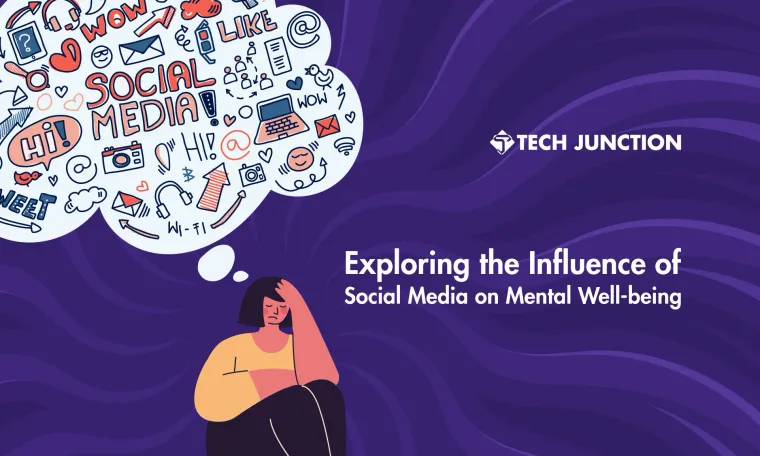In the age of hashtags and endless scrolling, it is impossible to deny the profound influence of social media on our daily lives. From its inception, social media has brought about a digital revolution, connecting people across the globe and redefining the way we communicate. However, this rapid transformation has come with its consequences. Scrolling through our social media feeds, we experience a rollercoaster of emotions, from joy and inspiration to anxiety and envy. The influence of social media on our mental well-being is a topic that has garnered significant attention in recent years.
Investigating the Role of Social Media on Mental Health
The connection between social media and mental health issues is a topic of ongoing research and debate. Studies have explored how excessive use can lead to conditions like depression and anxiety, but it is vital to remember that not all experiences are the same. On the one hand, social media platforms have revolutionized the way we connect and communicate with the world. However, the flip side of the coin reveals a darker narrative. The relentless comparison culture that thrives on social media can trigger feelings of inadequacy, anxiety, and depression.
Positive Influence of Social Media
Social media can be a source of support and connection for those struggling with mental health issues. Communities have formed online, offering empathy and resources to those in need. The influence of social media can potentially improve mental well-being, given the right circumstances. Let us look at some of the pros of social media.
1. Connection and Support:
- Community Building: Social media platforms allow individuals to create and join communities that cater to their interests, including mental health support groups. These communities can provide a strong sense of belonging and a safe space to share personal experiences and challenges.
- Global Reach: Social media transcends geographical boundaries, enabling people to connect with friends and family worldwide. This global reach can be especially comforting for expatriates, travelers, or those who have moved away from their hometowns.
2. Access to Information and Resources:
- Education and Awareness: Social media is a rich source of information on mental health issues, from the latest treatment options to coping strategies. Mental health organizations and professionals use these platforms to share their expertise, raise awareness, and reduce the stigma around mental health.
- Crisis Support: Some platforms offer crisis helplines and chat services, providing immediate support to distressed individuals. This quick response can be life-saving for those going through a mental health crisis.
3. Reduced Stigma:
- Storytelling and Empowerment: Personal stories shared on social media can break down the barriers of stigma. When individuals open up about their mental health journeys, it encourages others to seek help and share their experiences. This empowerment can lead to more open conversations in society.
- Advocacy and Activism: Social media amplifies the voices of mental health advocates, helping to drive policy changes and allocate resources to mental health programs. It is a powerful tool for those committed to improving their mental health.
4. Expressing Creativity and Self-Expression:
- Artistic Outlets: Many users use social media as a platform for creative expression, sharing art, writing, and music. This can enhance their sense of accomplishment, self-esteem, and overall well-being.
- Validation and Feedback: Positive feedback and support from an online community can boost an individual's self-confidence and motivation to continue their creative pursuits.
Negative Influence of Social Media
Some individuals, mostly teenagers, may be more prone to the negative influence of social media due to their personal circumstances or psychological makeup. Recognizing these factors is crucial for understanding the relationship between social media and mental health. This section will explore the cons of social media on mental health.
1. Comparison and Inadequacy:
- Idealized Lives: With carefully curated content, social media presents an idealized version of people's lives. This can lead to harmful comparisons, making individuals feel inadequate in comparison to the seemingly perfect lives of others. The Royal Society for Public Health in the UK conducted a survey in which 70% of people reported that they believed social media platforms like Facebook, Instagram, and Snapchat made them feel inadequate.
- Negative Self-Perception: A report from the National Institute for Mental Health (NIMH) in the United States highlights that 11.2% of adolescents aged 12-17 had at least one major depressive episode in 2020, with social media playing a role in exacerbating feelings of sadness and hopelessness. Continuous exposure to these idealized images and experiences can erode self-esteem, potentially leading to anxiety and depression as an impact of social media on youth.
2. Cyberbullying and Harassment:
- Emotional Harm: Online platforms can be breeding grounds for cyberbullying and harassment, causing significant emotional harm to victims. This can result in feelings of fear, anxiety, and isolation, adversely affecting mental health.
- Youth Vulnerability: According to a study by the Pew Research Center, as of 2021, 81% of Americans aged 18-29 use social media. This demographic is particularly vulnerable to the influence of social media on their mental health. Younger users are more active on social media and are particularly susceptible to cyberbullying, making them more vulnerable to mental health challenges.
3. Addictive Behavior:
- Notification Anxiety: The constant notifications and endless scrolling on social media platforms can lead to heightened anxiety, as users feel compelled to respond promptly to every alert.
- Validation-Seeking Loop: Pursuing validation through likes, comments, and shares can create an addictive loop where self-worth becomes intrinsically linked to online approval. This can lead to a sense of emptiness when validation is lacking.
4. Privacy Concerns:
- Data Anxiety: Sharing personal information and data on social media can raise concerns about privacy and security. Worries about data breaches or identity theft can create stress and anxiety, negatively impacting mental health.
- Overexposure: As an influence of social media, oversharing personal information online can lead to feelings of vulnerability, especially when dealing with sensitive topics like mental health.
5. Filter Bubbles and Echo Chambers:
- Polarization: Social media algorithms often prioritize content aligning with users' beliefs and preferences. This can lead to echo chambers and filter bubbles, limiting exposure to diverse opinions.
- Stress and Anxiety: This polarization can intensify stress and anxiety when individuals encounter differing viewpoints or contentious issues, potentially harming their mental well-being. The National Survey on Drug Use and Health reported that in 2020, 36.1% of adults aged 18-25 experienced symptoms of anxiety or depressive disorder, with social media use contributing to feelings of anxiety and depression in this age group.
Pros and Cons of Social Media on Healthcare
The integration of social media in healthcare has brought both opportunities and challenges. This discussion will explore the pros and cons of social media's role in healthcare.
Pros of Social Media in Healthcare
The influence of social media on healthcare offers valuable benefits. It is a vital platform for health education, with 53% of adults seeking health-related information online. Healthcare professionals use social media to share evidence-based health information, empowering informed decisions. Support communities on social media provide emotional connections for those with health conditions, benefiting 30% of patients with chronic illnesses. Patient engagement improves, with 60% of healthcare professionals believing that social media enhances the quality of patient care. Additionally, it plays a pivotal role in destigmatizing mental health, with 70% of individuals seeing it as a platform for a more understanding society.
Cons of Social Media in Healthcare
Nevertheless, social media in healthcare has its drawbacks. Misinformation spreads easily, with 63% of adults encountering false health information online. Privacy concerns arise, as sharing health information can lead to data breaches. Social media can contribute to body image issues and depression, especially among the younger demographic. Information overload affects users, causing confusion and anxiety, impacting many individuals seeking health information. It is crucial to critically assess the credibility of sources, especially in healthcare.
Wrapping Up the Complex Relationship between Social Media and Mental Well-being
In conclusion, the influence of social media on mental well-being is undeniable. Its impact on youth, healthcare, and mental health is multifaceted, with positive and negative aspects. As we continue to explore this intricate relationship, we must learn to navigate the digital world with mindfulness, balance, and a focus on mental well-being. By doing so, we can harness the benefits of social media while mitigating its potential harm, ensuring that it remains a tool for connection and support rather than a source of distress.
The Tech Junction is the ultimate hub for all things technology. Whether you're a tech enthusiast or simply curious about the ever-evolving world of technology, this is your go-to portal. If you want to write for us or have any feedback feel free to email us.



